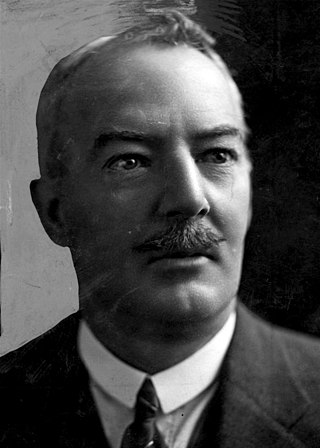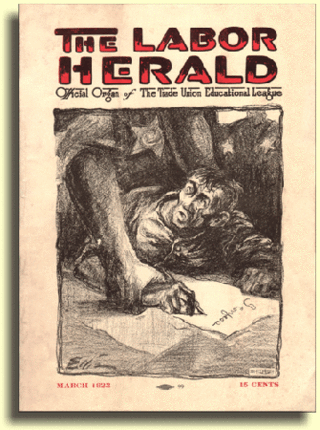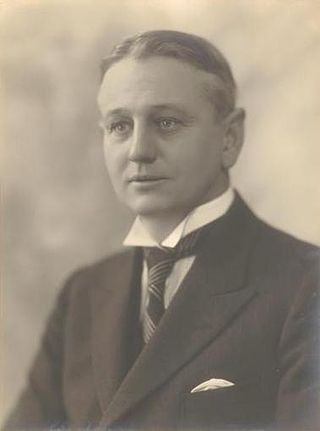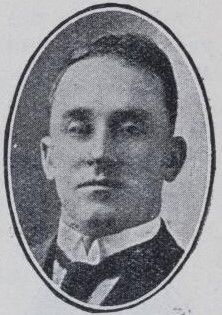The Australian labour movement began in the early 19th century and since the late 19th century has included industrial and political wings. Trade unions in Australia may be organised on the basis of craft unionism, general unionism, or industrial unionism. Almost all unions in Australia are affiliated with the Australian Council of Trade Unions (ACTU), many of which have undergone a significant process of amalgamations, especially in the late 1980s and early 1990s. The leadership and membership of unions hold and have at other times held a wide range of political views, including communist, socialist and right-wing views.

Edward James "Jack" Holloway was an Australian politician who served in the House of Representatives from 1929 to 1951, representing the Labor Party. He served as a government minister under James Scullin, John Curtin, Frank Forde, and Ben Chifley.
SA Unions is the peak body for trade unions in South Australia. It coordinates political, social, economic, and industrial campaigns between its affiliate members and implements the policies of the Australian Council of Trade Unions in South Australia.

The Trade Union Educational League (TUEL) was established by William Z. Foster in 1920 as a means of uniting radicals within various trade unions for a common plan of action. The group was subsidized by the Communist International via the Workers (Communist) Party of America from 1922. The organization did not collect membership dues but instead ostensibly sought to both fund itself and to spread its ideas through the sale of pamphlets and circulation of a monthly magazine.

Sir James O'Grady, was a trade unionist and Labour Party politician in the United Kingdom. He was the first colonial governor appointed by the Labour Party from within its own ranks.

Edward Grayndler was an Australian trade unionist and politician. He served as general secretary of the Australian Workers' Union (AWU) from 1912 to 1941, the longest term in the union's history.

The Hon Andrew Alexander Kirkpatrick was an Australian politician, representing the South Australian Branch of the Australian Labor Party. He was a member of the South Australian Legislative Council from 1891 to 1897 and 1900 to 1909, a member of the South Australian House of Assembly from 1915 to 1918, and again a member of the Legislative Council from 1918 to 1928. He was the state Agent General in London from 1909 to 1914. Kirkpatrick was state Labor leader from 1917 to 1918, when the party split nationally over Billy Hughes' stance on conscription.

Edward Riley was an Australian politician. He was an Australian Labor Party member of the Australian House of Representatives for South Sydney from 1910 to 1931.

John Lloyd (Jack) Price was an Australian politician and trade unionist. He was an Australian Labor Party member of the South Australian House of Assembly for Port Adelaide from 1915 to 1925. He later served in the Australian House of Representatives for Boothby from 1928 until his death in 1941, but left the Labor Party and joined the United Australia Party, following the 1931 Labor split over government responses to the Great Depression.

Mary Reid Anderson was a Scottish suffragist and was a leading trades unionist. She was the general secretary of the Women's Trade Union League and was involved in the formation of the National Federation of Women Workers and National Anti-Sweating League.

Thomas Patrick Howard was an Australian trade unionist and politician. He was a member of the South Australian House of Assembly from 1933 to 1938, representing the Lang Labor Party (1933), South Australian Lang Labor Party (1933–1934) and Labor Party (1934–1938).

Allen Gee was a British trade unionist and politician. He worked in the woolen industry in Huddersfield, founded the General Union of Textile Workers and became the first president of the Huddersfield Trades Council. A strong supporter of the Weavers' campaign for an eight-hour day, Gee was elected General Secretary of the West Yorkshire Power-Loom Weavers Association. He was involved in the founding of the Independent Labour Party and served on the Labour Representation Committee. Gee was also chairman of the General Federation of Trade Unions and ran unsuccessfully for the Labour Party in the 1918 general election.
The Herald was a weekly trade union magazine published in Adelaide, South Australia between 1894 and March 1910; for the first four years titled The Weekly Herald. It was succeeded by The Daily Herald, which ran from 7 March 1910 to 16 June 1924.

Frederick Samuel Wallis was a trade unionist and politician in the state of South Australia.

John McInnes was an Australian politician. He was a member of the South Australian House of Assembly from 1918 to 1950, representing the electorates of West Torrens (1918–1938) and Hindmarsh (1938–1950). He was a member of the Labor Party throughout his career, apart from 1931 to 1934, when he represented the splinter Parliamentary Labor Party. He served as Speaker of the South Australian House of Assembly from 1924 to 1926.

Alfred Joseph Blackwell was an Australian politician who represented the South Australian House of Assembly multi-member seat of West Torrens from 1918 to 1938 for the Labor Party, excluding the 1931–34 Labor split, when he sat with the splinter Parliamentary Labor Party.

Thompson Green was an Australian politician who represented the South Australian House of Assembly multi-member seats of Port Adelaide from 1910 to 1915 and West Torrens from 1915 to 1918. He was a member of the United Labor Party until 1917, when he left to join the National Party in the 1917 Labor split.

Elizabeth Rose Hanretty (1881–1967) was an Australian political activist. She was a prominent woman in the labour movement, and served as the Australian Labor Party's South Australian assistant state secretary for forty years.
The Dalfram dispute of 1938 was a political industrial dispute at Port Kembla, New South Wales, protesting the export of pig iron from Australia to Japan during the Second Sino-Japanese War. It became famous for providing the nickname of Pig Iron Bob to Attorney General Robert Menzies, later to serve as Prime Minister.

Lilian Sophia Locke was an Australian trade unionist, political campaigner and suffragette. She has been described as one of the earliest women leaders of the labour movement in Australia.

















